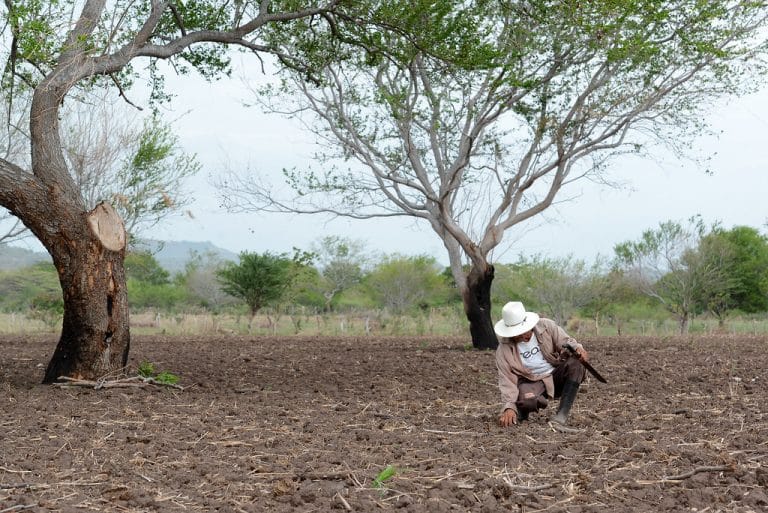3 de noviembre 2023

European Concern over Lack of Academic Freedom in Nicaragua

PUBLICIDAD 1M
PUBLICIDAD 4D
PUBLICIDAD 5D
The forced exit of the non-government organizations has increased their “feelings of vulnerability and personal despair about the future

A woman working in the field. Photo: Confidencial
The massive closure of NGOs in Nicaragua, perpetrated by the dictatorship of Daniel Ortega and Rosario Murillo, has “negatively” impacted various sectors of the country, but particularly women and rural residents. That’s the conclusion of the report “Nicaraguan Municipalities: between political subordination and citizen rejection,” prepared by the Central American Association for Development and Democracy Local Network.
The report details that both women and the farm sector “are net losers in the face of a patriarchal and misogynist regime, with an insatiable predatory appetite for natural resources.”
The study is “qualitative and exploratory,” involving 62 interviews conducted in 19 municipalities of Nicaragua, “despite the repressive conditions” imposed by the Ortega-Murillo dictatorship.
In terms of services to women, the shuttered organizations focused on: “training workshops, counseling in sexual reproductive health, and empowerment for defending their rights within the structural patriarchal system that excludes them at all levels of daily life.”
Meanwhile, in the case of the rural population, the NGOs acted as “transmitters of technologies and new practices to groups that traditionally lived and worked in isolation,” with such projects as promoting vegetable gardens or orchards for family consumption, sustainable agriculture promotion, micro-financing programs, and seed banks, among other things.
According to the document, the closure of NGOs “negatively impacted diverse spheres of development in the rural world, directly affecting areas such as the protection of the environment, promotion of food sovereignty and security, equity and inclusion, and the development of fair-trade channels.”
The cancellation of the NGOs’ legal status, in the view of Local Network, “has completed the cycle of destruction of civic and democratic spaces.” To these political consequences, “the impact on the life of people in the municipalities must also be added in.”
The study notes that the rural sector, where the greatest levels of poverty are found, has been “particularly sensitive to this authoritarian rampage of the Ortega-Murillo regime.”
The report states that when the interviewers asked those responding if they knew of any NGOs that had been closed in their municipality, “practically all of them identified at least two of these national or international organizations.”
“In some municipalities, they [the NGOs] had been incorporated into local life in such a way that several interviewees considered them part of the local government structures, due to their contribution to daily life, their proximity to the population, their participation in the work of local development, and the different types of support they’d given the municipalities (advice, training, contributions to the execution of works),” the document specifies.
Due to this close integration into the communities, none of the people consulted seemed to understand the reasons for the closure and withdrawal of the organizations, “either because it occurred through an administrative action taken in Managua, or because no local explanations for the suspension were offered,” the report points out.
The people interviewed for the study recognized that one effect of the withdrawal of organizations from their municipalities “is an increase in social vulnerability and a feeling of helplessness and personal hopelessness about the future.”
Based on the responses the study recorded, the “Local Network” association “roundly” affirmed that the organizations “comprised the main social safety network for the excluded and vulnerable sectors that neither the government nor the market could – or perhaps wanted to – include within their activities.” The report continued: “the former [the government], for reasons of sectarian public policies that leave those not politically of interest outside the protective net; and the latter [the marketplace] because it’s not interested in incorporating as consumers those who aren’t profitable.”
Because of this, they believe that the NGOs “acted as a cushion, in the face of the inequities of the State and the market’s non-inclusive policies,” especially in their attention to women, youth, children and the adult and indigenous population.
The report contends that the NGOs acted as agents for the emancipation of marginalized sectors, as well as offering civic empowerment to the citizens.
After the women, the other population group most often cited by the interviewees were the youth, since many NGOs worked on “prevention of risky behaviors, such as drugs, gangs and human trafficking; sex education and the strengthening of civic values and the capacity for self-organization.”
Another benefitted sector were the children, as a previous Confidencial report also indicated. This sector was the recipient of “preschool nutrition and education programs, where they were provided with materials to draw, color and other creative arts.”
The report notes that the NGOs also contributed “by forming dance groups or groups for understanding nature,” with a particular focus on children “without parents, to prevent human trafficking, abuse and child labor.”
This article was originally published in Spanish in Confidencial and translated by Havana Times

PUBLICIDAD 3M
Confidencial es un diario digital nicaragüense, de formato multimedia, fundado por Carlos F. Chamorro en junio de 1996. Inició como un semanario impreso y hoy es un medio de referencia regional con información, análisis, entrevistas, perfiles, reportajes e investigaciones sobre Nicaragua, informando desde el exilio por la persecución política de la dictadura de Daniel Ortega y Rosario Murillo.
PUBLICIDAD 3D